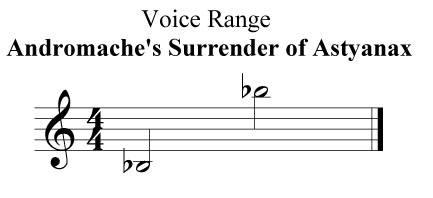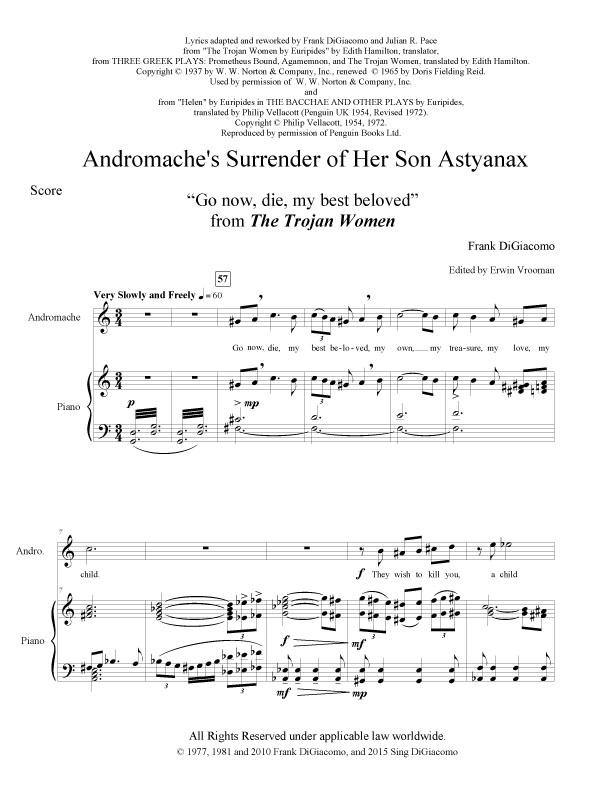Lyrics adapted and reworked by Frank DiGiacomo and Julian R. Pace from “The Trojan Women by Euripides” by Edith Hamilton, translator, from THREE GREEK PLAYS: Prometheus Bound, Agamemnon, and The Trojan Women, translated by Edith Hamilton.
Copyright © 1937 by W. W. Norton & Company, Inc., renewed © 1965 by Doris Fielding Reid.
Used by permission of W. W. Norton & Company, Inc.
and
from “Helen” by Euripides in THE BACCHAE AND OTHER PLAYS by Euripides,
translated by Philip Vellacott (Penguin UK 1954, Revised 1972). Copyright © Philip Vellacott, 1954, 1972.
Reproduced by permission of Penguin Books Ltd.
Part of a powerful scene in which Andromache, wife of the Trojan hero Hector, the son of Queen Hecuba, must voluntarily surrender her son, Astyanax, to be killed. The Greek kings have commanded that the child is to be thrown down and killed from a high tower so that no male heir of the house of King Priam shall be left to take revenge when he is old enough to raise an army. If Andromache does not allow this horror, the child’s body will be left to the elements without proper burial, like the remains of a lonely animal. She has no choice but to surrender her son and bid him farewell.
Included in the product offering is a transcription of the orchestration by the Composer to show the richness of the sound palette. The orchestral score for the excerpt listed is available. Contact singdigiacomo@gmail.com with your request.
The Andromache's Surrender of Astyanax has not yet been performed. If you or your organization are interesting in learning and recording this piece, SingDiGiacomo would be interested in the results. If the DiGiacomo Family approves, your performance could be featured on this website and any sales accruing from your performance, available to you, or your organization. Please contact us at singdigiacomo@gmail.com for more information.

LYRICS
(ANDROMACHE looks steadfastly at her son ASTYANAX; at last, she addresses him.)
Andromache:
Go now, die, my best beloved, my own,
my treasure, my love, my child.
They wish to kill you, a child innocent of all wrong.
You are taken from me by cruel hands,
and leave me, and leave me,
leave me comfortless and alone! Ah!
They kill you because your father was too good a man,
he could save others, but for all his goodness, he cannot save you.
Weeping? Are you weeping, my little one, my own?
You cannot know what it is awaits you;
you cannot know how it will be —
so why do you hold me with your little hands
so tightly, ah, so tightly,
like a baby bird hiding under its mother’s wing —
and your father will not come,
he will not come from his tomb to save you
or your poor mother,
or even to look at us one more time.
How will it be to die like that, my little one,
no one to pity you,
you little thing curled in my arms?
Has your life, your little life, been for nothing then?
Kiss me, kiss me,
come closer, closer —
now kiss me, lips to lips —
come closer, put your arms around my neck....
never to hold you again!
Never to hold you again,
the mother who bore you.
(She pushes ASTYANAX from her toward TALTHYBIUS.)
Quick! Take him, seize him!
Cast him down!
Feast on his flesh, if you wish!
God! God has destroyed me
and I cannot save my own child from death!
(She mounts the tumbril and is immediately taken away.)